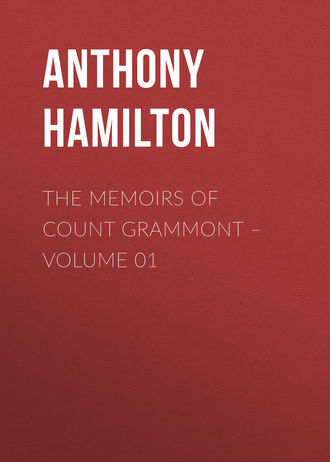
Anthony Hamilton
The Memoirs of Count Grammont – Volume 01
About the year 1704, Hamilton turned his attention to collecting the memoirs of his brother-in-law, the Count de Grammont, as we may conjecture, from the epistle beginning "Honneur des rives eloignees" being written towards the close of the above year: it is dated, or supposed to be so, from the banks of the Garonne. Among other authors whom Hamilton at first proposes to Grammont, as capable of writing his life (though, on reflection, he thinks them not suited to it), is Boileau, whose genius he professes to admire; but adds that his muse has somewhat of malignity; and that such a muse might caress with one hand and satirize him with the other. This letter was sent by Hamilton to Boileau, who answered him with great politeness; but, at the same time that he highly extolled the epistle to Grammont, he, very naturally, seemed anxious to efface any impression which such a representation of his satiric vein might make on the Count's mind, and accordingly added a few complimentary verses to him: this letter is dated, Paris, 8th February, 1705. About the same time, another letter was written to Hamilton on the subject of the Epistle to Grammont, by La Chapelle, who also seemed desirous that his life should be given to the public, but was much perplexed which of the most celebrated ancients to compare the count to. Mecaenas first presented himself to his imagination: absurdly enough, in my opinion; for there was not a trace of similitude between the two characters. This, however, afforded him some opportunity, as he thought, of discovering a resemblance between Horace and Hamilton, in which he equally failed. Petronius is then brought forward, as affording some comparison to the Count; – a man of pleasure, giving up the day to sleep, and the night to entertainment; but then, adds La Chapelle, it will be suggested that, such is the perpetual activity of the Count of Grammont's mind, he may be said to sleep neither night nor day; and if Petronius died, the Count seems determined never to die at all. (He was at this time about eighty-five years of age.) It may well be supposed that all this, though now perfectly vapid and uninteresting, was extremely flattering to Grammont; and the result was, that he very much wished to have his life, or part of it, at least, given to the public. Hamilton, who had been so long connected with him, and with whose agreeable talents he was now so familiarized, was, on every account, singled out by him as the person who could best introduce him historically to the public. It is ridiculous to mention Grammont as the author of his own Memoirs: his excellence, as a man of wit, was entirely limited to conversation. Bussy Rabutin, who knew him perfectly, states that he wrote almost worse than any one. If this was said, and very truly, of him in his early days, it can hardly be imagined that he would, when between eighty and ninety years of age, commence a regular, and, in point of style, most finished composition. Besides, independent of everything else, what man would so outrage all decorum as to call himself the admiration of the age? for so is Grammont extolled in the Memoirs, with a variety of other encomiastic expressions; although, perhaps, such vanity has not been without example. Hamilton, it is true, says that he acts as Grammont's secretary, and only holds the pen, whilst the Count dictates to him such particulars of his life as were the most singular, and least known. This is said with great modesty, and, as to part of the work, perhaps with great truth: it requires, however, some explanation. Grammont was more than twenty years older than Hamilton; consequently, the earlier part of his life could only have been known, or was best known, to the latter from repeated conversations, and the long intimacy which subsisted between them. Whether Grammont formally dictated the events of his younger days, or not, is of little consequence from his general character, it is probable that he did not. However, the whole account of such adventures as he was engaged in, from his leaving home to his interview with Cardinal Mazarin (excepting the character of Monsieur de Senantes, and Matta, who was well known to Hamilton), the relation of the siege of Lerida, the description of Gregorio Brice, and the inimitable discovery of his own magnificent suit of clothes on the ridiculous bridegroom at Abbeville; all such particulars must have been again and again repeated to Hamilton by Grammont, and may therefore be fairly grounded on the count's authority. The characters of the court of Charles II., and its history, are to be ascribed to Hamilton: from his residence, at various times, in the court of London, his connection with the Ormond family, not to mention others, he must have been well acquainted with them. Lady Chesterfield, who may be regarded almost as the heroine of the work, was his cousin-german.
[She was born at the castle of Kilkenny, July, 1640, as appears from Carte's life of her father, the Duke of Ormond.]
But, although the history altogether was written by Hamilton, it may not perhaps be known to every reader that Grammont himself sold the manuscript for fifteen hundred livres; and when it was brought to Fontenelle, then censor of the press, he refused to license it, from respect to the character of the Count, which, he thought, was represented as that of a gambler, and an unprincipled one too. In fact, Grammont, like many an old gentleman, seems to have recollected the gaieties of his youth with more complaisance than was necessary, and has drawn them in pretty strong colours in that part of the work which is more particularly his own. He laughed at poor Fontenelle's scruples, and complained to the chancellor, who forced the censor to acquiesce: the license was granted, and the Count put the whole of the money, or the best part of it, in his pocket, though he acknowledged the work to be Hamilton's. This is exactly correspondent to his general character: when money was his object, he had little, or rather no delicacy.
The History of Grammont may be considered as unique there is nothing like it in any language. For drollery, knowledge of the world, various satire, general utility, united with great vivacity of composition, Gil Blas is unrivalled: but, as a merely agreeable book, the Memoirs of Grammont perhaps deserve that character more than any which was ever written: it is pleasantry throughout, pleasantry of the best sort, unforced, graceful, and engaging. Some French critic has justly observed, that, if any book were to be selected as affording the truest specimen of perfect French gaiety, the Memoirs of Grammont would be selected in preference to all others. This has a Frenchman said of the work of a foreigner: but that foreigner possessed much genius, had lived from his youth, not only in the best society of France, but with the most singular and agreeable man that France could produce. Still, however, though Grammont and Hamilton were of dispositions very different, the latter must have possessed talents peculiarly brilliant, and admirably adapted to coincide with, and display those of his brother-in-law to the utmost advantage. Gibbon extols the "ease and purity of Hamilton's inimitable style;" and in this he is supported by Voltaire, although he adds the censure, that the Grammont Memoirs are, in point of materials, the most trifling; he might also in truth have said, the most improper. The manners of the court of Charles II. were, to the utmost, profligate and abandoned: yet in what colours have they been drawn by Hamilton? The elegance of his pencil has rendered them more seductive and dangerous, than if it had more faithfully copied the originals. From such a mingled mass of grossness of language, and of conduct, one would have turned away with disgust and abhorrence; but Hamilton was, to use the words of his admirer, Lord Orford, "superior to the indelicacy of the court," whose vices he has so agreeably depicted; and that superiority has sheltered such vices from more than half the oblivion which would now have for ever concealed them.
The Count de Grammont died in 1707. Some years after the publication of his Memoirs, Hamilton was engaged in a very different work: he translated Pope's Essay on Criticism into French, and, as it should seem, so much to that great poet's satisfaction, that he wrote a very polite letter of thanks to him, which is inserted in Pope's Correspondence. Hamilton's Essay was, I believe, never printed, though Pope warmly requested to have that permission: the reign of Louis XIV. had now ceased; and, for several years before his death, the character of the old court of that prince had ceased also: profligacy and gaiety had given way to devotion and austerity. Of Hamilton's friends and literary acquaintance few were left: the Duke of Berwick was employed in the field, or at Versailles: some of the ladies, however, continued at St. Germain; and in their society, particularly that of his niece, the Countess of Stafford (in whose name he carried on a lively correspondence with Lady Mary Wortley Montague), he passed much of his time. He occasionally indulged in poetical compositions, of a style suited to his age and character; and when he was past seventy, he wrote that excellent copy of verses, 'Sur l' Usage de la Vie dans la Vieillesse'; which, for grace of style, justness, and purity of sentiment, does honour to his memory.
Hamilton died at St. Germain, in April, 1720, aged about seventy-four. His death was pious and resigned. From his poem, entitled Reflections, he appears, like some other authors, to have turned his mind, in old age, entirely to those objects of sacred regard, which, sooner or later, must engage the attention of every rational mind. To poetry he bids an eternal adieu, in language which breathes no diminution of genius, at the moment that he for ever recedes from the poetical character. But he aspired to a better.
Whatever were Hamilton's errors, his general character was respectable. He has been represented as grave, and even dull, in society; the very reverse, in short, of what he appears in his Memoirs: but this is probably exaggerated. Unquestionably, he had not the unequalled vivacity of the Count de Grammont in conversation; as Grammont was, on the other hand, inferior, in all respects, to Hamilton when the pen was in his hand; the latter was, however, though reserved in a large society, particularly agreeable in a more select one. Some of his letters remain, in which he alludes to his want of that facility at impromptu which gave such brilliancy to the conversation of some of his brother wits and contemporaries. But, while we admit the truth of this, let it be remembered, at the same time, that when he wrote this, he was by no means young; that he criticised his own defects with severity; that he was poor, and living in a court which itself subsisted on the alms of another. Amidst such circumstances, extemporary gaiety cannot always be found. I can suppose, that the Duchess of Maine, who laid claim to the character of a patroness of wit, and, like many who assert such claims, was very troublesome, very self-sufficient, and very 'exigeante', might not always have found that general superiority, or even transient lustre, which she expected in Hamilton's society: yet, considering the great difference of their age and situation, this circumstance will not greatly impeach his talents for conversation. But the work of real genius must for ever remain; and of Hamilton's genius, the Grammont Memoirs will always continue a beauteous and graceful monument. To that monument may also be added, the candour, integrity, and unassuming virtues of the amiable author.







